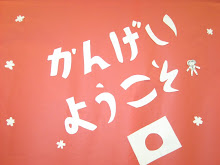Monday, March 8, 2010 An Eight Period Day
ANNOUNCEMENT TO ALL CLASSES: “Parent meeting for Japan Exchange will take place on Wed., March 10, at 6:30, in room 110.”
First Period – Japanese 3—room 110
Instructions for students: “Read page 84 in text and translate into English the Japanese portion. Also translate all of page 86 into English. Hand all this in at the end of the period.”
Advisory – sophomore advisory 201
Fifth Period – Japanese 1 – room 110
Please print out the section below and make 30 copies. One of the copies should be enlarged for Stephanie Hernandez (Mrs. Bogunia or Mrs. Wynn in room 108 can help you) Handout for Japanese 1 class:
Kanji for days of the week,in sentences.Note how the pronunciation of each kanji
changes in different settings. What do these sentences mean? Translate them into English. You may use your dictionaries and charts. Sometimes you may have to guess!
日よう日 の 日月(じつげつ) は やさしい です。
月よう日 の 月(つき) を みました か。
火よう日 の 山 の 火じ(かじ) は むずかしい です。
水よう日 の 川 の お水(おみず) を きいて ください。
木よう日 の おおきい 木(き) は さわって ください。
みんな は 金よう日 の お金(おかね) が すき です。
土よう日 の 火山(かざん) の 土(つち)は きたない です ね。
More kanji combinations to think about – try to write a new sentence for each one.
火水:ひみず fire-and-water, in other words, discord
水月:すいげつ reflection of the moon (in the water)
月月:つきづき every month 金本い:きんほんい gold standard
土木がく:どぼくがく civil engineering
Sixth Period – Japanese 2 – room 110
Instructions for students: “Using the information about the seasons on page 68 of rhe textbook, write a description of a high school student’s activities in 2009. You must write at least 6 sentences for each season, 24 sentences in all, and include time indicators for months as well. Be sure to include information about what your student wears in each season. Write on every other line on a page of notebook paper and hand it in at the end of the period. “
Seventh period – Japanese 4 and AP Japanese – room 110
Instructions for students: “Answer all the questions on page 67 of A Homestay in Japan, writing at least two complete sentences in Japanese for each answer (and that includes the true and false questions). Hand in at the end of the class period. Don’t forget to double-space. Try to use as many as possible of the grammar forms we’ve been working on.”
About Me

- O.Kimeru
- M.A. 1992 from U. of Chicago; Japan Foundation Fellow in 1987-88; research fellow Yokohama City University; Japanese language teacher since 1991; also taught French (member American Association of Teachers of French), English as a Second Language (to students), methodology of teaching ESL (to Japanese high school teachers), English, Japanese history/culture, drama; in 2002 and 2004, listed in Who's Who Among America's Teachers; member of Chicago Sister Cities Osaka Committee, and chair of its Education Sub-Committee; vice-president Illinois Association of Teachers of Japanese; Payton H.S. World Language Department Chair from 2003-2007, under founding principal Mrs. Gail Ward; taught Japanese and coordinated Japan Exchange at Payton from 2003 to 2010; Japanese teacher at Burr Public School beginning August, 2010
Followers
Blog Archive
-
▼
2010
(88)
-
▼
March
(16)
- March 26, 2010 A Block Two Day
- March 25, 2010 A Seminar Day
- March 24, 2010 A Block Two Day
- March 23, 2010 A Block One Day
- March 22, 2010 An Eight Period Day
- March 19, 2010 An Eight Period Day
- March 17, 2010 A Block Two Day
- March 16, 2010 A Block One Day
- March 15, 2010 An Eight Period Day
- March 12, 2010 An Eight Period Day
- March 10, 2010 A Block Two Day
- March 9, 2010 A Block one Day
- March 8, 2010 An Eight Period Day
- March 5, 2010 An Eight Period...
- March 3, 2010 A Block Two Day
- March 2, 2010 A Block One Day
-
▼
March
(16)